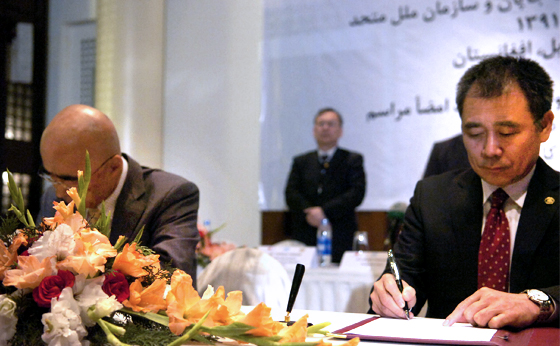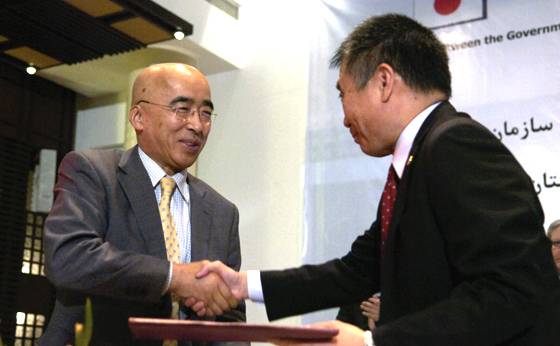KABUL, Afghanistan, 28 February 2013
The Government of Japan approved a JPY2,187 million (app. USD23.77 million) of grant assistance to UN-Habitat for its Community-Based Municipal Support Programme in five cities (Kabul, Kandahar, Herat, Mazar-e-Sharif and Jalalabad) to support the municipalities to manage the rapid urban growth by strengthening their institutional capacity in service delivery to the citizens. At the signing ceremony held in Kabul the Note on the grant assistance was signed and exchanged between the Government of Japan and Mr. Yoshinobu Fukasawa, Senior Human Settlements Officer of UN-Habitat Regional Office for Asia and the Pacific - Fukuoka.
The assistance approved aims to support one of the national development priorities, Local Governance, identified by the Government of Afghanistan, and is a part of the commitment made by the Government of Japan in last July at the Tokyo Conference. UN-Habitat continues to expand its municipal support programme to promote local governance in partnership with the Ministry of Urban Development Affairs, the Independent Directorate for Local Governance and Kabul Municipality.
Afghanistan is rapidly urbanizing as can be seen in the target cities with nearly 5% annual population growth. This urban growth is an irreversible process, and due to the extreme poverty many households are living in informal settlements without access to public services. Urban poverty and social exclusion are on the rise and half of the Afghan population are expected to be living in cities by 2050.
To be able to make cities functioning and capable of managing such expected rapid urban growth strengthening institutional capacity of municipal governance is essential. In response the project helps the municipalities to improve their capacities to support local development through effective, efficient and accountable delivery of public services. In addition, the project addresses the challenges of urban poverty with improving access to basic services and infrastructure through community empowerment.
Given that municipal institutions will be at the centre of implementing municipal strategic plans and its service delivery, and promoting security of tenure in informal settlements, UN-Habitat has shifted its development support from direct delivery of basic services and infrastructure to supporting local governments to deliver these essential services. This shift from stabilization to governance is in line with the desire of the Government of Afghanistan to gradually hand over the responsibilities of service delivery to local governments.
UN-Habitat would like to thank the Government of Japan for its consistent support and giving this opportunity to assist in supporting communities and local governments. Through the Community-Based Municipal Support Programme, UN-Habitat supports urban development by strengthening municipalities to deliver basic services through engaging communities and creating solidarity among citizens.


Left: Hon. Hiroshi Takahashi, Ambassador Extraordinary and Plenipotentiary of Japan to the Islamic Republic of Afghanistan;
Right: Mr. Yoshinobu Fukasawa, Senior Human Settlements Officer, UN-Habitat ROAP
Total Budget: JPY2,187 million (app. USD23.77 million)
Period: Two years (April 2013 to March 2015)
Location: Cities of Kabul, Kandahar, Herat, Mazar-e-Sharif and Jalalabad
Partners: Independent Directorate for Local Governance, Ministry of Urban Development Affairs, Kabul Municipality and Communities







